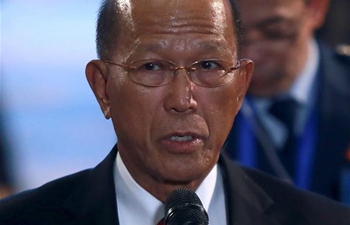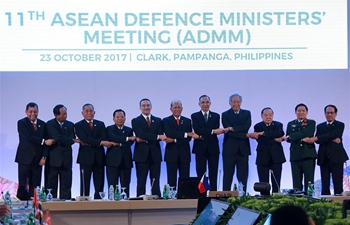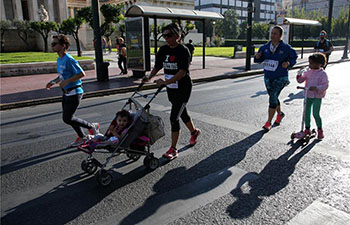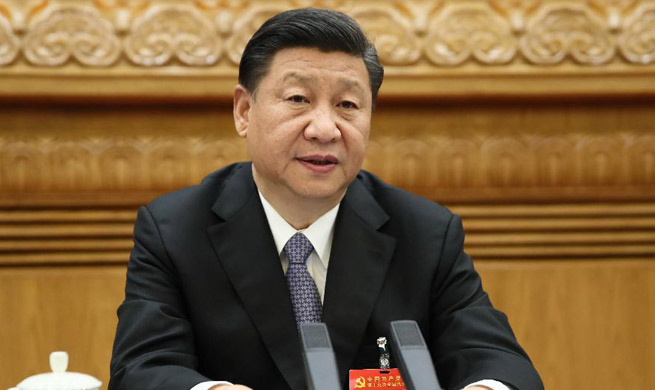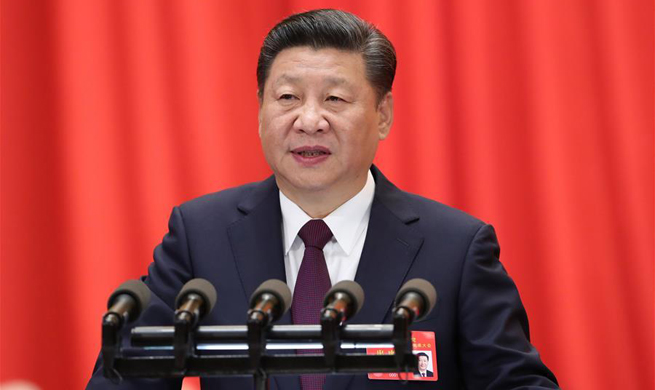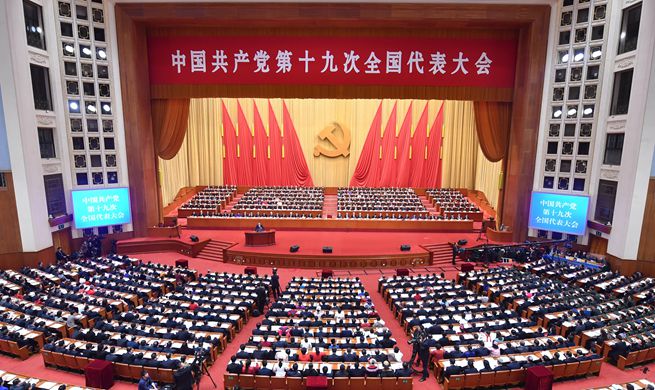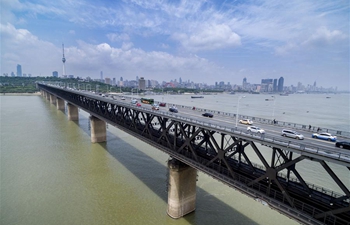by Keren Setton
JERUSALEM, Oct. 23 (Xinhua) -- In the southern cities of Israel, the horizon is green and quiet. New houses are being built, and railway tracks are being laid down. Amidst those new beginnings, tractors are driving back and forth along Israel's border with Gaza, erecting a new barrier between the two.
The mosque minarets from Gaza blend in with the high-rise buildings from Ashkelon in what can be a confusing image for the naked eye. It's hard to tell where the border lies.
With all this quiet, Israel is still hard on the defensive, preparing itself for a future conflict that it is sure will arrive.
"Hamas is working 24/7 on how to surprise us and punch us and we are working hard in order to amputate that hand," a senior Israeli military commander tells Xinhua, three years after Israel and Hamas fought their last war.
There seems to be a consensus on both sides that another war is merely a matter of time.
Hamas was dealt a severe blow during the 2014 conflict.
In addition to the lopsided death toll, tens of Israelis, most of them soldiers and thousands of Palestinians, many of them militants, the Gaza Strip was severely damaged.
Reconstruction in Gaza has been progressing slowly ever since. Although significant funds, 3.5 billion U.S. dollars, have been promised by the international community, not all has been disbursed according to the World Bank.
On the Israeli side, the southern area which was accustomed to barrages of missile fire, things are looking up.
"Things are blooming and we feel very safe," says Adi Meiri, the spokeswoman of the Shaar He Negev Regional Council. "This is a blessed calm period," Meiri told Xinhua.
Before the last war, when tensions were running high, there was negative immigration from Israel's south.
"We are now fully populated, there is a waiting list of people wanting to live here. There is construction that never was before," says Meiri.
But the south of Israel is dotted with reminders of a tense past and a potentially problematic future. Shelters are everywhere, never too far to be found.
"Hamas is using every resource it has in order to get stronger and improve all of its capabilities," the senior commander said.
On several occasions, Israel has claimed Hamas is using money and materials aimed at rehabilitation of the Gaza Strip in order to re-arm itself and upgrade its offensive capabilities.
One of the main catalysts of the 2014 war was the discovery of tens of cross border tunnels which Hamas built in order to infiltrate Israel and carry out attacks against soldiers and civilians.
According to the Israeli military, these were destroyed during the war.
"Hamas is busy digging (new) tunnels underneath the borders with Israel, manufacturing weapons, improving their missile capabilities," said Mkhaimer Abusada, a professor of Political Science at the Gaza Al-Azhar University. "They are wasting no time in improving their military capabilities preparing for the next war, but they are saying they are not interested in another war."
"Hamas is putting all of its effort into achieving an image of victory at the beginning of a future conflict," the senior Israeli officer tells Xinhua. "They are counting down the time to the next conflict. Hamas will pick a time that is convenient for them."
A tunnel which will allow Hamas militants to enter Israel and attack targets could serve as such an image.
But according to Abusada, the Palestinians in the Gaza Strip are not interested in a war and neither is Hamas.
"Palestinians in Gaza say, why in Gaza? Do we have to keep paying the price? They are exhausted, they are tired...this is the last thing in the minds of the Palestinians," Abusada told Xinhua.
Israel's fierce offensive in 2014 left Gaza crippled. To begin with, the territory was not in good shape. One of the poorest, most populated regions in the world, many areas in Gaza were reduced to rubble during the war.
While many of the homes that were destroyed during the war have been reconstructed, there is still much more work to be done.
These images of damage still serve as a deterrent to Hamas.
"Today, it is clear to the other side (Hamas), that the minute they try, our response will be harsh. The equation is working. They are deterred, weakened and think ten times before they act," the senior Israeli commander told Xinhua.
Hamas' need for quiet has become increasingly apparent in recent weeks as it agreed, yet again, to begin a reconciliation process with its rival, the Fatah organization led by Palestinian President Mahmoud Abbas.
Hamas forces brutally kicked out the Palestinian National Authority (PNA) from Gaza in 2007.
Recently, Abbas has asked Israel to reduce its power supply to the territory in an attempt to increase the pressure on the militant Islamic organization.
Gazans are getting by with about four hours of electricity a day. Hamas, in response to the pressure, has agreed to cede some administrative authority in Gaza back to the PNA.
"There has never been such a long period of quiet," said the senior Israeli military commander.
The quiet is the result convergence of mutual interests and also mutual deterrence. While Israel has the upper hand militarily, Hamas is capable of dealing severe blows to Israel. Currently, neither side have an interest in disturbing the peace, albeit a fake one.






